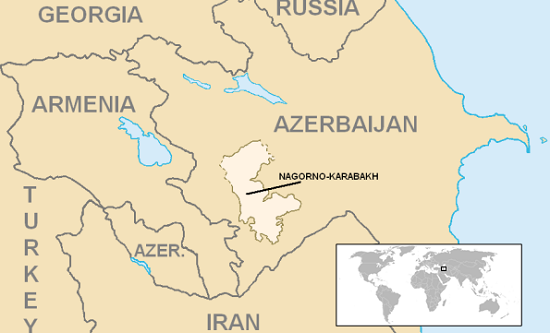
After six weeks of fighting between Armenian and Azerbaijani forces in Nagorno-Karabakh, the two sides accepted a ceasefire proposed by Russia’s President Putin on 9 November. Armenians will retain governance of the capital Stepanakert but have ceded territory to Azerbaijan that they won in fighting in 1992-94. Had they not agreed to the deal, Armenia stood to lose all of Nagorno-Karabakh. Nagorno-Karabakh is largely Armenian and Christian; Azerbaijan is Turkic and Muslim. While formally in Azerbaijan, Nagorno-Karabakh has been run as an autonomous state by Armenians since 1994. Azerbaijan demanded the return of the land and control over its administration.
An estimated 5,000 people were killed in the fighting and some 90,000 Armenians and 40,000 Azeris were displaced. 70% of Stepanakert’s 55,200 residents had fled the city. According to The Daily Telegraph, by 3 November Azerbaijan claimed to have captured enough territory to settle 500,000 people. ‘This will be a great day in the history of Azerbaijan’, announced its President, Ilham Aliyev, on reaching the ceasefire agreement. Turkey’s defence minister, Hulusi Akar, visited Azerbaijan’s capital Baku and was ecstatic, ‘The present situation is very pleasing for us. This operation is an awakening…The Azerbaijani army has shown its power to the whole world.’ Akar said Turkey and Azerbaijan were ‘two states, one nation… The heroism and courage Azerbaijani forces showed in 44 days of operations is worth being told for 44 years.’ In Yerevan, Armenia’s capital, crowds occupied the parliament building in protest at the deal and the parliamentary speaker was beaten unconscious.
Just hours before the peace deal was agreed, Armenian forces had lost the strategically important and culturally significant town of Shusha (Shushi in Armenian) and Azeri forces admitted to shooting down a Russian helicopter over Armenia. Armenia has a defence pact with Russia and if the fighting spread from Nagorno-Karabakh into Armenia there was a risk that Russian troops would be brought into the fighting. Under the peace deal, almost 2,000 Russian soldiers will patrol the front line between Armenian and Azeri forces and along the Lachin corridor linking Stepanakert with Armenia. Several symbolically important Armenian sites are now under Azerbaijan’s control. Turkey’s parliament voted to approve the deployment of Turkish troops to join the Russian soldiers in Nagorno-Karabakh. Turkey’s President Erdogan said that the presence of Turkish troops and ‘if needed, civilian personnel…[will] be to the benefit of the peace and prosperity of the regional people and necessary for our national interests’.
Armenia’s forces could not match Azeri firepower. 60% of Azerbaijan’s arms procurement came from Israel; Israel gets 40% of its oil supplies from Azerbaijan. However, Turkey’s military sales to Azerbaijan rose six-fold in 2020, including drones, rocket launchers and ammunition. Turkey also supplied Azerbaijan with F-16 fighter jets and approximately 2,000 mercenary jihadists drawn from Syria, where they fight the Kurds. Russia’s military intelligence service said ‘separate elements of Turkish intelligence work’ in the conflict zone. Turkey and the Azerbaijani governments prepared for the conflict together. Turkey’s government rejected several attempts at negotiating ceasefires before 9 November.
With Azerbaijan’s and Turkey’s success, the Turkish state-controlled media celebrated: from the Aegean Sea to China ‘all nations between these two points are Turkic… The world should understand that it is not easy to push Turkey to give up its rights, whether in the Mediterranean or anywhere else,’ said Hamza Tekin. In his book The Grand Chessboard (1997), former US National Security Advisor Zbigniew Brzezinski describes control of Eurasia as key to wielding global strategic power. Linguistically and culturally many of the nations in this region are linked to Turkey. Erdogan, his Justice and Development Party (AKP) and their National Movement Party (MHP) allies have pan-Turkic and neo-Ottoman ambitions. The Russian government presumably does not want to antagonise Turkey while it is trying to ease it away from NATO and the US; Putin told the Armenian government that it would be ‘suicide’ not to accept the ceasefire terms – and the accompanying loss of territory.
Four days after celebrating victory in Nagorno-Karabakh, Erdogan made a provocative visit to Northern Cyprus. Turkish exploration vessels have been challenging Cypriot and Greek jurisdiction over eastern Mediterranean waters where natural gas reserves have been found. Turkey’s claim on the territory has drawn a regional and international response. France has agreed a military pact with Greece and sent its warships into the disputed waters to counter Turkey. France backed Armenia in Nagorno-Karabakh and its foreign minister demanded the removal of all foreign fighters from the territory. In Lyon, on 1 November, the memorial to Armenian victims of the 1915-23 Ottoman genocide was vandalised with pro-Turkey, pro-Erdogan inscriptions. The perpetrators were members and supporters of the fascist Grey Wolves, linked to the MHP. Erdogan supporters intimidated and attacked Armenians on French city streets. France then banned the Grey Wolves.
Turkey’s expansionist ventures that stoke the chauvinism is unsustainable. While Erdogan and his ministers congratulate themselves on their triumph in the Caucasus Turkey’s economy is heading for rocks. The Turkish lira had lost 46% of its value against the US dollar when Erdogan fired Turkey’s central bank governor on 7 November. The next day, Erdogan’s son-in-law resigned as finance minister. Turkey had used up $140bn in a futile attempt to prop up the lira and its foreign reserves depleted. Turkey’s average income per head has fallen from $12,500 in 2013 to $9,000. On 19 November, the new central bank governor announced the biggest interest rate rise in two years of 4.75% to try and stop the lira dropping and attract foreign investment. The lira briefly rallied but then fell; international capital will demand more rate rises and cuts to government spending – murderous foreign adventures will not satisfy the Turkish masses or put meals on their tables. Erdogan’s Ottoman ambitions are built on quicksand.
Trevor Rayne




